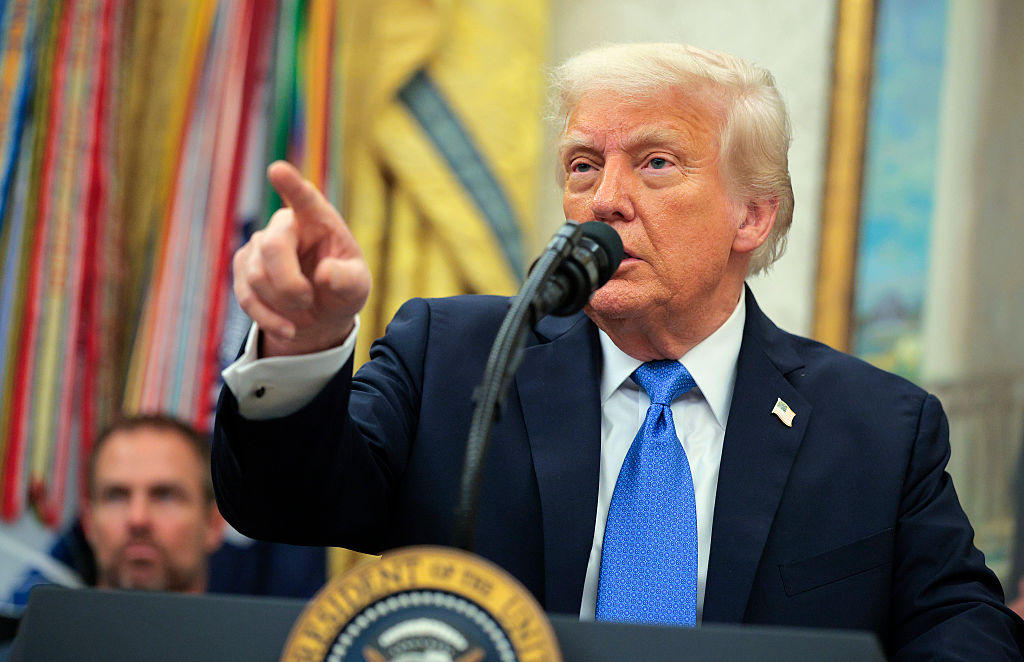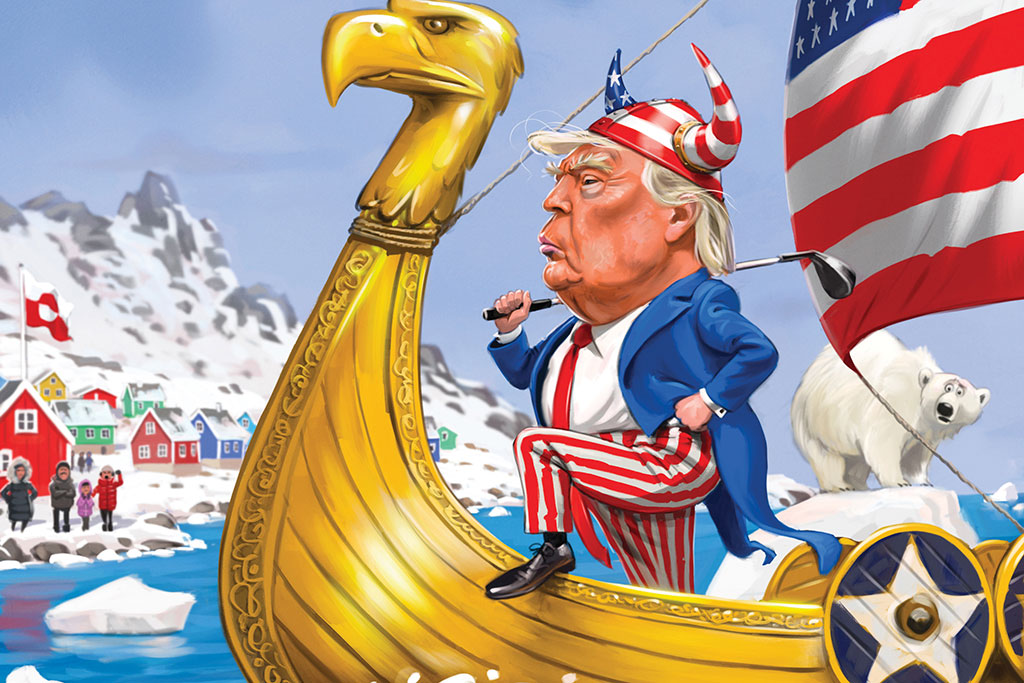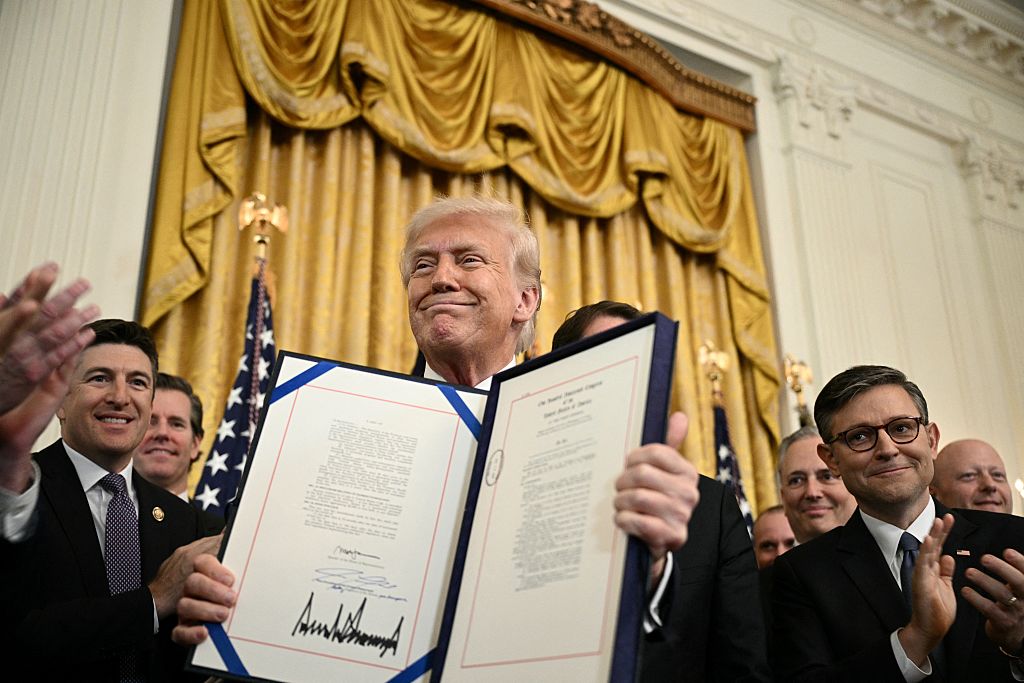Donald Trump has one last chance to avert a recession in the US
Trump's chaotic policymaking has hurt businesses’ confidence. The US president must get his act together to avoid a full-blown recession, says Matthew Lynn


Get the latest financial news, insights and expert analysis from our award-winning MoneyWeek team, to help you understand what really matters when it comes to your finances.
You are now subscribed
Your newsletter sign-up was successful
Want to add more newsletters?

Twice daily
MoneyWeek
Get the latest financial news, insights and expert analysis from our award-winning MoneyWeek team, to help you understand what really matters when it comes to your finances.

Four times a week
Look After My Bills
Sign up to our free money-saving newsletter, filled with the latest news and expert advice to help you find the best tips and deals for managing your bills. Start saving today!
Wall Street was booming after the presidential election last November. Big business was planning a wave of investment, and global multinationals were shifting operations to the United States.
The expectation was that president Donald Trump would run a pro-business, pro-enterprise administration. Yet there has been little sign of it so far.
The president’s time in government has been dominated by a huge round of tariffs – a disguised tax, and one that will provoke chaos in supply chains.
MoneyWeek
Subscribe to MoneyWeek today and get your first six magazine issues absolutely FREE

Sign up to Money Morning
Don't miss the latest investment and personal finances news, market analysis, plus money-saving tips with our free twice-daily newsletter
Don't miss the latest investment and personal finances news, market analysis, plus money-saving tips with our free twice-daily newsletter
We have seen chaotic policymaking, damaging confidence, with plans changing day by day. And we may even see tax rises on the rich. It has hardly been an inspiring mix, and it is not a great surprise that US businesses’ confidence has fallen sharply over the last few months. Wall Street has recovered most of its losses from the spring, but there has not been any sign of a “Trump Bump”.
Over the next few weeks, Trump will have one last chance to fix that. The Budget set to be agreed this month gives him a chance to push forward with his deregulation agenda. Some of the early signs are promising.
The deal under discussion includes a loosening of financial regulations, easing the restrictions on bank capital that were imposed after the crash of 2009. The banks have complained that the rules are so tightly written that they effectively prevent them from lending nearly as much as they could. The result? Small firms have been starved of credit. Sure, the regulators need to make sure there is not another crash, but they also need to allow the banks to do their job. If the rules are loosened, it will help the economy.
We may finally see some of the work of Elon Musk’s Department of Government Efficiency, or DOGE, bearing fruit. Even though Musk is stepping back to try to fix Tesla, DOGE has made progress on rooting out waste. It has managed to cut back on spending on diversity, equality and inclusion (DEI), returning the government to the simple principle of hiring the best person for each job, and perhaps more importantly, it has persuaded many of America’s biggest companies to ditch the DEI baggage.
Likewise, a bill to create a legal framework for cryptocurrencies is making its way through Congress, and that may well cement America’s lead in the industry. And of course, the Budget may well include significant tax reforms, even if the president has floated the idea of an extra tax for anyone earning more than $2.5 million a year to help pay for the cuts for the middle class.
Can Trump beat his impressive first-term record?
Add it all up, and some progress has been made. But it is nothing close to what was achieved in Trump’s first term. In his initial four years in the White House, Trump managed to slash the rate of corporation tax, which had turned into one of the highest in the world, to make it competitive again with other major developed economies.
He set up investment zones, sometimes as little as a few blocks in size, to revitalise run-down areas in inner cities. And he at least tried to cut back on red tape with a law to force legislators to cut two regulations for every new one that was enacted. It was a successful mix, and one that was rewarded with decent levels of growth, rising wages, and a booming stock market. Nothing like as much has been achieved in his second term.
The administration should be doing far better. It won a decisive victory at the election, and the Republican party controls Congress. There is very little standing in Trump’s way. He could be cutting spending more systematically to try and get the budget deficit under control. He could be cutting back on the waste of his predecessor’s vast industrial subsidies. He could be dealing with the regulations that have been imposed over the last 20 years.
And he could be fixing a complex corporate tax system that still holds back investment and exports jobs and investment to countries such as Ireland. If president Trump doesn’t deliver on his promises of boosting confidence and turbo-charging growth, the US economy is going to face a sharp slowdown very soon, and potentially even a full-blown recession – and it is hard to imagine that he wanted that.
This article was first published in MoneyWeek's magazine. Enjoy exclusive early access to news, opinion and analysis from our team of financial experts with a MoneyWeek subscription.
Get the latest financial news, insights and expert analysis from our award-winning MoneyWeek team, to help you understand what really matters when it comes to your finances.

Matthew Lynn is a columnist for Bloomberg and writes weekly commentary syndicated in papers such as the Daily Telegraph, Die Welt, the Sydney Morning Herald, the South China Morning Post and the Miami Herald. He is also an associate editor of Spectator Business, and a regular contributor to The Spectator. Before that, he worked for the business section of the Sunday Times for ten years.
-
 How a ‘great view’ from your home can boost its value by 35%
How a ‘great view’ from your home can boost its value by 35%A house that comes with a picturesque backdrop could add tens of thousands of pounds to its asking price – but how does each region compare?
-
 What is a care fees annuity and how much does it cost?
What is a care fees annuity and how much does it cost?How we will be cared for in our later years – and how much we are willing to pay for it – are conversations best had as early as possible. One option to cover the cost is a care fees annuity. We look at the pros and cons.
-
 How a dovish Federal Reserve could affect you
How a dovish Federal Reserve could affect youTrump’s pick for the US Federal Reserve is not so much of a yes-man as his rival, but interest rates will still come down quickly, says Cris Sholto Heaton
-
 New Federal Reserve chair Kevin Warsh has his work cut out
New Federal Reserve chair Kevin Warsh has his work cut outOpinion Kevin Warsh must make it clear that he, not Trump, is in charge at the Fed. If he doesn't, the US dollar and Treasury bills sell-off will start all over again
-
 How Canada's Mark Carney is taking on Donald Trump
How Canada's Mark Carney is taking on Donald TrumpCanada has been in Donald Trump’s crosshairs ever since he took power and, under PM Mark Carney, is seeking strategies to cope and thrive. How’s he doing?
-
 Why does Trump want Greenland?
Why does Trump want Greenland?The US wants to annex Greenland as it increasingly sees the world in terms of 19th-century Great Power politics and wants to secure crucial national interests
-
 'Investors should brace for Trump’s great inflation'
'Investors should brace for Trump’s great inflation'Opinion Donald Trump's actions against Federal Reserve chair Jerome Powell will likely stoke rising prices. Investors should prepare for the worst, says Matthew Lynn
-
 The steady rise of stablecoins
The steady rise of stablecoinsInnovations in cryptocurrency have created stablecoins, a new form of money. Trump is an enthusiastic supporter, but its benefits are not yet clear
-
 A change in leadership: Is US stock market exceptionalism over?
A change in leadership: Is US stock market exceptionalism over?US stocks trailed the rest of the world in 2025. Is this a sign that a long-overdue shift is underway?
-
 King Copper’s reign will continue – here's why
King Copper’s reign will continue – here's whyFor all the talk of copper shortage, the metal is actually in surplus globally this year and should be next year, too